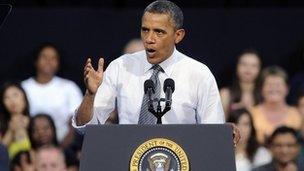Obama talks tough
- Published

President Obama criticised Mitt Romney's response at a campaign event in Las Vegas
President Obama seems determined to both talk and act tough after the attack in Libya. He told an audience in Las Vegas: "We want to send a message all around the world to anybody who will do us harm - no act of terror will dim the light of the values that we proudly shine on the rest of the world."
He went on: "No act of violence will shake the resolve of the United States of America... we will keep going, we will keep going because the world needs us. We are the one indispensable power in the world."
He's spoken to the father and mother of Chris Stevens, the ambassador who was killed in the attack and told them justice would be done. In a TV interview he said: "we go after anybody who would attack Americans."
It would seem, after talk like that, that failure is not an option. He's backed up his version of American exceptionalism by moving two warships off the coast of Libya and sending 50 marines from an anti-terrorist squad to the country. The Pentagon won't comment on reports that drones are being flown across eastern Libya searching for possible militant camps.
'Playing politics'
It is clear his response to the first killing of an American ambassador for 30 years is an election issue. Mitt Romney seized on a statement from the Cairo embassy to argue that the president was keen to apologise for American values and was sending mixed messages. He repeated this argument forcefully at a news conference even before the president had made a statement in the Rose Garden.
If you want to know what the commentators think of Mr Romney's strategy you can choose between "noxious and indecent, external", "rash and shameful, external", "craven and ill-advised, external" or "unfair and hyperbolic, external".
Although the latter is from Senator McCain's former chief of staff, conservatives have a point when they say most of the condemnation comes from liberals in the "mainstream media".
There are those who defend Mr Romney, external, but in the last two years of following him I can't remember such unity of scorn from the media.
President Obama has joined in, accusing Mr Romney of shooting first and aiming later saying: "As president, one of the things I've learned is you can't do that, that it's important for you to make sure that the statements you make are backed up by the facts, and that you've thought through the ramifications before you make them."
This has yet to play out, but Mitt Romney stands accused of playing politics with a tragedy - a dangerous game when the president holds most of the cards.
UPDATE: My colleague Regan Morris was at the Las Vegas rally on Wednesday night and sent this report on the mood in the crowd:
President Obama started on a sombre note, by quelling cheers of "four more years" to mourn the loss of four Americans in Libya and send "heartfelt prayers to their loved ones".
But many said they were more concerned about jobs and the economy. Nevada, a swing state, has the highest unemployment rate in the nation at 12%.
Still Libya overshadowed the event: "I hope he doesn't start another war," Stanley Sabbath said. "He's got to figure out how they'll go about resolving it - without starting a war."
Andrew Davis, 20, brought his newborn daughter Gabrielle. "I'm more concerned with jobs. We have this little one we're trying to support now and it's not easy," Mr Davis said.
Many at the rally did not realise that the American consulate in Libya had been attacked. As the president spoke, people in the crowd murmured: "Libya? What happened in Libya?"
After the rally, an undecided voter said he was still sitting on the fence about who to vote for and feared neither Barack Obama nor Mitt Romney could respond to the situation in Libya without more conflict: "It's terrible - we might be in for another road of heartache here," he said.